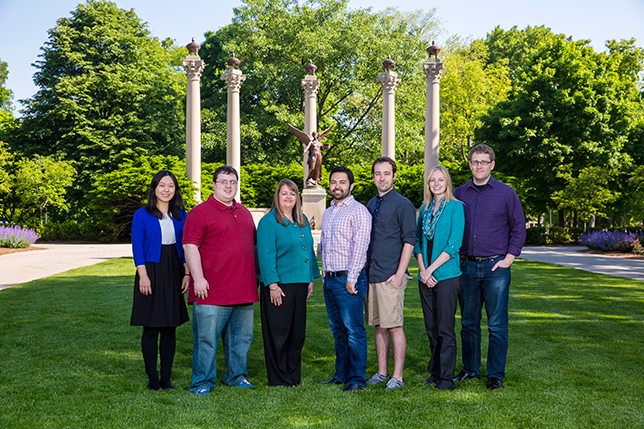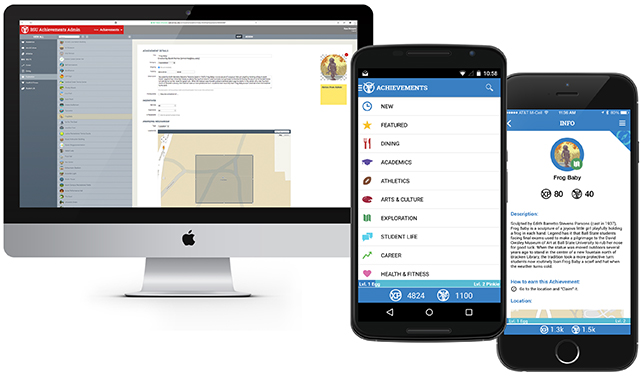Achieving Student Success Through Gamification
To improve retention and outcomes for Pell grant students, Ball State University developed a mobile app that uses gamification to incentivize positive activity outside the classroom.
Category: Student Systems and Services
Institution: Ball State University
Project: Ball State Achievements
Project lead: Kay Bales, vice president for student affairs and dean of students
Tech vendors/partners: Developed in-house

The Ball State Achievements team (left to right): Wen Qi, Scott Reinke, Kay Bales, Jonathan Blake Huer, Gunnar Hoffman, Brittanie Middleton and Ryan Bitzegaio (Ball State Photographic Services)
Student affairs professionals have long believed that non-academic aspects of campus life can have a significant impact on student success. Students who form social networks on campus, attend campus events or are involved in Greek life, for example, are more likely to complete their degrees.
So two years ago, as executives at Ball State University were thinking about how to improve student outcomes, they looked for ways to motivate students to become more active on campus. And they found an unlikely role model: Weight Watchers.
"Their users have individual goals related to losing weight. Our students have individual goals related to to getting to commencement and becoming gainfully employed," explained Kay Bales, vice president for student affairs and dean of students. "We looked at how people would use apps to find things that would motivate them to continue on in the weight loss process. From that, we started brainstorming about which of those principles we could use to create something that would assist our Pell grant students."
The result, Ball State Achievements, is a mobile app designed to improve retention and outcomes for Pell grant students by gamifying positive activity outside the classroom — providing a gentle nudge for students to take advantage of the opportunities already provided on campus.

The Ball State Achievements App incentivizes activities such as forming social networks on campus, engaging in Greek life or other student organizations, attending career center or other "work skills" events, and maintaining a healthy lifestyle.
"Our underlying premise is that if students are incentivized to do things that are helpful to them, then they will take advantage of it," Bales said. "It doesn't matter to us which particular activities students are engaged in; it is the fact that they are connecting with peers."
The Achievements app is like a frequent flier program for students. Students are awarded "Experience" points and "Bennies" as they complete various "Achievements." The Experience points accumulate and students can spend Bennies (named after Ball State's Beneficence statue) as a currency in exchange for bookstore items such as clothes, or at the campus Starbucks. The app encourages positive behaviors that occur outside the traditional classroom such as forming social networks on campus, engaging in Greek life or other student organizations, attending career center or other "work skills" events, and maintaining a healthy lifestyle.
With initial funding in 2013 from Next Generation Learning Challenges and Educause, Ball State tested a beta version of the app in the fall 2013 semester. Then with additional funding from NGLC, Ball State's Emerging Technologies program built native Android and iOS apps from scratch over a six-month period. In partnership with Student Affairs, it made a commitment to run the Achievements program for a full three years starting in fall 2014.